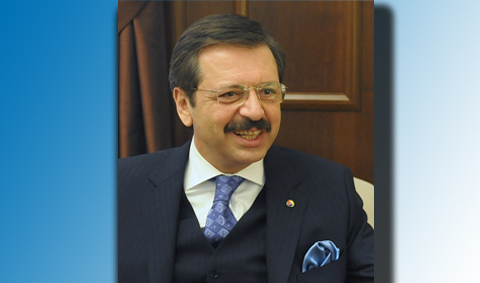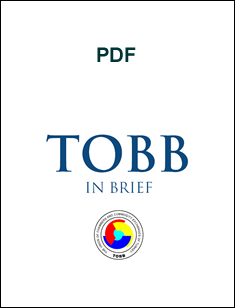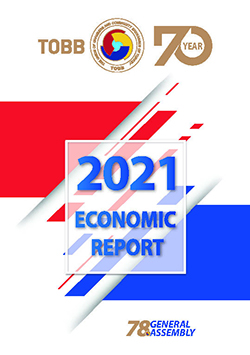TOBB saves companies from a burden of 6.1 billion Liras

02.07.2012 / Paris France
Assessing the changes to the new Turkish Trade Law (TTK), TOBB President M. Rifat Hisarcıklıoğlu stated that with the changes made, companies have been saved from a burden of 6.1 billion Liras. Hisarcıklıoğlu reported that they have taken an active part in the process as TOBB and that changes have been made to 109 articles on the request of the business world.
Emphasizing that the new Turkish Trade Law will deeply affect Turkish trade life in a revolutionary manner, Hisarcıklıoğlu said, “We have voiced our opinion that the 50 year old trade law needs to be changed as the business world. However, when we inspected the new law, we observed that changes to certain articles needed to be made. We communicated these requests to the government. The government noted these requests. I would like to first thank Ali Babacan and Hayati Yazıcı for listening to us and helping us. They showed once more that they stand by the private sector.”
Stating that essential changes in 25 articles would have effected another 84 articles, therefore collateral changes needed to be made to those, Hisarcıklıoğlu said, “The Economic Coordination Council (EKK) where the changes to the TTK were discussed was attended from the business world by just TOBB. We held 3 EKK meetings with the TTK on the agenda. We put around 30 hours into it. We assessed the changes closely. The change package passed through the Justice Commission on June 21st. The package was accepted at the Assembly General Council on the 27th of June.”
- What changed?
TOBB President Hisarcıklıoğlu summarized the changes to the new Turkish Trade Law:
- The extent of independent inspections narrowed down
“The extent of independent inspections has been narrowed down. The authority to define this extent has been granted to the Ministers’ Council. SMEs will remain outside this. At most, 10,000-15,000 of our large companies will be subject to it. This way, our companies will save 4.5 billion Liras per year.
- Changes to the approval of ledgers
The third change is regarding the opening and closing approvals. The number of approvals required has been reduced. The online ledgers have been removed. Online ledgers no longer require approvals. Ledgers with sufficient pages will continue to be used after the changes. Closure approval is required for daily wage and Board ledgers. This provides 300 million Liras in notary savings.
- Website no longer mandatory
The fourth development is in regards to websites. The obligation to have a website has been removed. Only large companies subject to inspections will maintain a website. Our SMEs will save 600 million Liras per year.
- Financial statements no longer published online
Financial statements will no longer be published online or on the registry gazette. This is more to do with the disclosing of commercial confidentiality rather than saving money. This was unacceptable. Why should my neighbor and competitor know how much money I have? Regardless, we’ve achieved savings by doing this. This will bring about savings of over 600 million Liras.
- Limited companies will be able to distribute advance dividends
As you know if the law in its current state were to go into effect, limited companies would be at a huge disadvantage. Thanks to the changes made, limited companies will now be able to distribute advance dividends. As with corporations, limited companies are going to be able to be established with 25% cash capital and 24 month commitments. The article stating that the loans made to a limited company cannot be claimed once bankruptcy has been declared has been removed.
- Article preventing boards of directors from taking loans removed
Taking loans for partners has become freely available in all instances excepting 2 conditions. These are in the cases of previous commitment debts and in the case where provisions are paying for the debts of previous years. This means that if the company was able to make a surplus it will be able to take loans.
On the other hand the article preventing boards of directors from taking loans has been removed. Only close relatives and independent members who are not partners of the company will not be able to take loans from the company.
- “Resignation on negative review from inspectors” removed
The matter of inspection results is very important for us. The instance where the board would resign on the negative review from inspectors has had resignation removed. It has been changed so that the General Assembly is free to reelect the same board of directors afterwards.
- Ledgers will be kept according to the Tax Procedural Law
A regulation to determine how ledgers will be kept has been made in order to eliminate confusion on the subject. Ledgers will be kept according to the Tax Procedural Law with financial statements prepared according to international standards.
The information required to be on all documentation has been limited to title, headquarters’ address, registry number and internet address.
This information will be on trade letters and accounting documents.
- Regulation for board member criteria
Criteria for board member have been removed. The requirement that at least 1 member of the board of directors has to be Turkish Republic citizen and that a quarter of the board has to have higher education have been removed.
- Congruity of the articles of incorporation with law extended to July 1st 2013
The matter of congruity of the articles of incorporation with law has been extended to July 1st 2013. This is very important. This has been a problem for a long time. A motion has been made to remove over 200,000 defunct companies from the registry. According to this after a 3 month suspension period registry directors will be able to remove said companies.
- Prison sentences have been changed to fines
The subject we were most focused on was the matter of heavy punishments brought on by the law. The amendment package has removed all freedom limiting sentences from the law. The punishments for 32 crimes have been changed to pecuniary punishments. Two definitions have been removed. Only serious offenses like counterfeiting and fraud have retained their penalties.”
- Control needed for checks
Stating that after the prison sentences have been removed from matters involving checks with no control mechanism to replace it, there has been a significant increase in bounced checks, Hisarcıklıoğlu said, “The least increase was March 2012 in comparison to the same month of the previous year by 22% the largest increase was in May 2012 in comparison to the May of the last year with 56.4%, increasing from 220,080 to 344,196.”
- “We have issued a call to increase trust in checks”
Stating that they issued a call to relevant Ministers and the Banks Union, Hisarcıklıoğlu said that they suggested that a system wherein traders could see their credit/check histories and work together, “This way, malignant operators would be eliminated from the market and trust in checks would increase. This, however, did not happen. The Banks Union chose to devise its own system. The system is very difficult. It requires a written application and waiting for a reply. There is significant amount of bureaucracy involved. These things are paced much faster. Trade is very fast, requiring on the moment decision making. Our system would have worked through SMS. We should be able to see the check history of the other side within 2-3 minutes. If we do not achieve this, checks will be lost from the market.”
- Increase in protested bills
Stating that the increase in protested bills and the cost thereof continues to increase, the TOBB President said, “When the first 5 months of 2012 are scrutinized individually, it is evident that protested bills, like bounced checks, have shown an increase when compared with the same months of the previous year.”
Hisarcıklıoğlu stated that the number of protested bills have increased by 13.5%, increasing from 401,000 to 541,000, when comparing the first 5 months of this year and the first 5 months of the last year. The cost of protested bills has increased by 24.7%, reaching 2.316 billion TL.
- West Anatolia Logistics Project (BALO)
Providing information regarding the West Anatolia Logistics Project (BALO), TOBB President M. Rifat Hisarcıklıoğlu stated that BALO Inc. is the result of the unity of the power of 74 chambers and commodity exchanges, 15 OIZs, UMAT and UTİKAD.
Reporting that they first thought of BALO Inc. as a Logistics Center to serve the West Anatolia Region, Hisarcıklıoğlu said, “It was developed by our chambers in the Aegean, the Manisa Chamber of Commerce and Industry. However, the more we worked on the project, the more we saw that there was a more widespread logistical problem throughout the whole of Anatolia. Especially in regards to transportation costs severely limited the trading power of the industrialists in Anatolia.”
- BALO is no longer just Western Anatolia project, but rather the Great Anatolia project
Although we have standing agreements with the European Union and the Customs Union, only our western provinces are able to take advantage of these opportunities, Hisarcıklıoğlu said, “İstanbul exports 51% of its total exports to Europe; İzmir and Bursa 61% and 78%, respectively, while Konya and Gaziantep only export 33% and 24%, respectively, to Europe. As transport costs decrease trading power, Anatolia is unable to partake in the Customs Union. This is why when BALO Inc. opened up to partnerships our chambers, commodity exchanges and OIZs in Anatolia showed great interest and bough majority of shares.
They have made the sacrifice to bring their cities into the European Market.
This is why I say that BALO is no longer the Western Anatolia Logistics Project. BALO is the Great Anatolia Logistics Project.”
- Railways are the most cost reducing mode of transport
Drawing attention to the fact that railways are the most cost and human error reducing mode of transport, Hisarcıklıoğlu said, “Anatolia attained its first railroad only 30 years after its invention.
When you consider that the printing press was brought to these lands 270 years after its invention, 30 years is a great improvement.
We were one of the first countries to use the railroad after countries like the USA, UK and Russia. The first railroad was laid between İzmir and Aydın. The line was extended to İstanbul and the Hejaz. Unfortunately we did not further develop this technology.
Where we stand today is that we are conducting 1% of our exports via railroad.
We are in such a state that we are unable to field a single freight train to Europe.
However, especially in the last 8 years, railroads have once again started to draw attention. There have been ver important investment made and they continue to be made.
- “Turkey is evolving”
Reporting that, especially in regards to high velocity train passenger transportation, Turkey is undergoing an evolution, Hisarcıklıoğlu stated that railroads have stopped being a dead investment.
Stating that the BALO project will be the counterpart revolution of this in regards to freight railroad transportation, Hisarcıklıoğlu said, “Our industrialists in Anatolia will transport their goods in the cheapest and the most timely manner to Europe. The transportation service will be conducted with the most modern systems on computers. The BALO project will become a global project with the established connection.”
Your message has been sent
Thank you |




